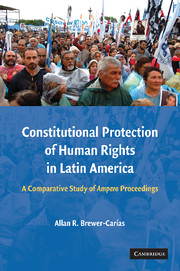 Constitutional Protection of Human Rights in Latin America
Constitutional Protection of Human Rights in Latin America Book contents
- Frontmatter
- Contents
- INTRODUCTION
- PART ONE THE CONSTITUTIONAL AND INTERNATIONAL DECLARATION OF HUMAN RIGHTS AND ITS JUDICIAL GUARANTIES
- PART TWO THE AMPARO AS A LATIN AMERICAN CONSTITUTIONAL AND INTERNATIONAL LAW INSTITUTION
- PART THREE THE INJURED PARTY AND THE CONSTITUTIONAL RIGHTS PROTECTED BY MEANS OF THE AMPARO PROCEEDING
- PART FOUR THE INJURY, THE INJURING PARTY AND THE INJURING ACTS OR OMISSIONS IN THE AMPARO PROCEEDING
- PART FIVE THE EXTRAORDINARY CHARACTER OF THE AMPARO PROCEEDING
- Chapter Seventeen The Question of the Admissibility of the Amparo Action and Its Relation with the Ordinary Judicial Means
- Chapter Eighteen The Main Principles of the Procedure in the Amparo Proceeding
- Chapter Nineteen The Configuration of the Main Phases of the Amparo Proceeding
- Chapter Twenty The Adjudication in the Amparo Proceeding and the Preliminary Protective Measures
- Chapter Twenty-One The Definitive Judicial Adjudication in the Amparo Suit
- Chapter Twenty-Two The Revision of the Amparo Decisions by the Constitutional Court or the Supreme Court
- CONCLUSION
- APPENDIX A List of Latin American Constitutions
- APPENDIX B List of Latin American Amparo Laws (Statutes)
- INDEX
Chapter Eighteen - The Main Principles of the Procedure in the Amparo Proceeding
Published online by Cambridge University Press: 08 August 2009
- Frontmatter
- Contents
- INTRODUCTION
- PART ONE THE CONSTITUTIONAL AND INTERNATIONAL DECLARATION OF HUMAN RIGHTS AND ITS JUDICIAL GUARANTIES
- PART TWO THE AMPARO AS A LATIN AMERICAN CONSTITUTIONAL AND INTERNATIONAL LAW INSTITUTION
- PART THREE THE INJURED PARTY AND THE CONSTITUTIONAL RIGHTS PROTECTED BY MEANS OF THE AMPARO PROCEEDING
- PART FOUR THE INJURY, THE INJURING PARTY AND THE INJURING ACTS OR OMISSIONS IN THE AMPARO PROCEEDING
- PART FIVE THE EXTRAORDINARY CHARACTER OF THE AMPARO PROCEEDING
- Chapter Seventeen The Question of the Admissibility of the Amparo Action and Its Relation with the Ordinary Judicial Means
- Chapter Eighteen The Main Principles of the Procedure in the Amparo Proceeding
- Chapter Nineteen The Configuration of the Main Phases of the Amparo Proceeding
- Chapter Twenty The Adjudication in the Amparo Proceeding and the Preliminary Protective Measures
- Chapter Twenty-One The Definitive Judicial Adjudication in the Amparo Suit
- Chapter Twenty-Two The Revision of the Amparo Decisions by the Constitutional Court or the Supreme Court
- CONCLUSION
- APPENDIX A List of Latin American Constitutions
- APPENDIX B List of Latin American Amparo Laws (Statutes)
- INDEX
Summary
The second aspect specifically conditioned by the extraordinary character of the amparo proceeding refers to the general rules governing the procedure, which in general terms are related to its bilateral character; to the brief and preferred character of the procedure; to the role of the courts directing the procedure and to the need for the substantial law to prevail regarding formalities.
THE BILATERAL CHARACTER OF THE PROCEDURE
One of the fundamental principles regarding the amparo proceeding is that although being of an extraordinary nature, the bilateral character of the proceeding must always be guarantied. This implies that the amparo proceeding must always be initiated by a party or parties (the injured or offended party), so no ex officio amparo proceeding is admissible. Consequently, the amparo proceeding must always be initiated by means of an action or a recourse brought before the competent court by a party against another party (the injurer or offender party) whose actions or omissions have violated or have caused harm to his constitutional rights. This party, as defendant, must always be brought to the procedure in order to guaranty his rights to defense and due process.
The final outcome of the amparo proceeding is always a judicial order, as also happens in the United States with the writs of injunction, mandamus or error, which are directed to the injuring party ordering to do or to abstain from doing something, or to suspend the effects, or annul the damaging act.
- Type
- Chapter
- Information
- Constitutional Protection of Human Rights in Latin AmericaA Comparative Study of Amparo Proceedings, pp. 346 - 353Publisher: Cambridge University PressPrint publication year: 2008


